Analysis of Hospitality: Skills, Gaps, and Development Factors
VerifiedAdded on 2023/06/08
|13
|4214
|493
Report
AI Summary
This report provides a comprehensive analysis of the contemporary hospitality industry, focusing on operational roles, skills requirements, and skills shortages within companies like The Dorchester in London. It examines various operational departments such as housekeeping, food production, food and beverage, and front office, highlighting the skills needed for each role, including flexibility, language proficiency, and communication. The report also addresses the skills gaps in the hospitality sector and proposes solutions through training and development programs. Furthermore, it includes a PESTLE analysis to evaluate the macro environmental factors impacting the development of organizations operating in the hospitality sector, along with a SWOT analysis of The Dorchester, assessing its strengths, weaknesses, opportunities, and threats. The report concludes by evaluating the influence of external factors on current and potential trends within the hospitality industry and how companies respond to these trends.
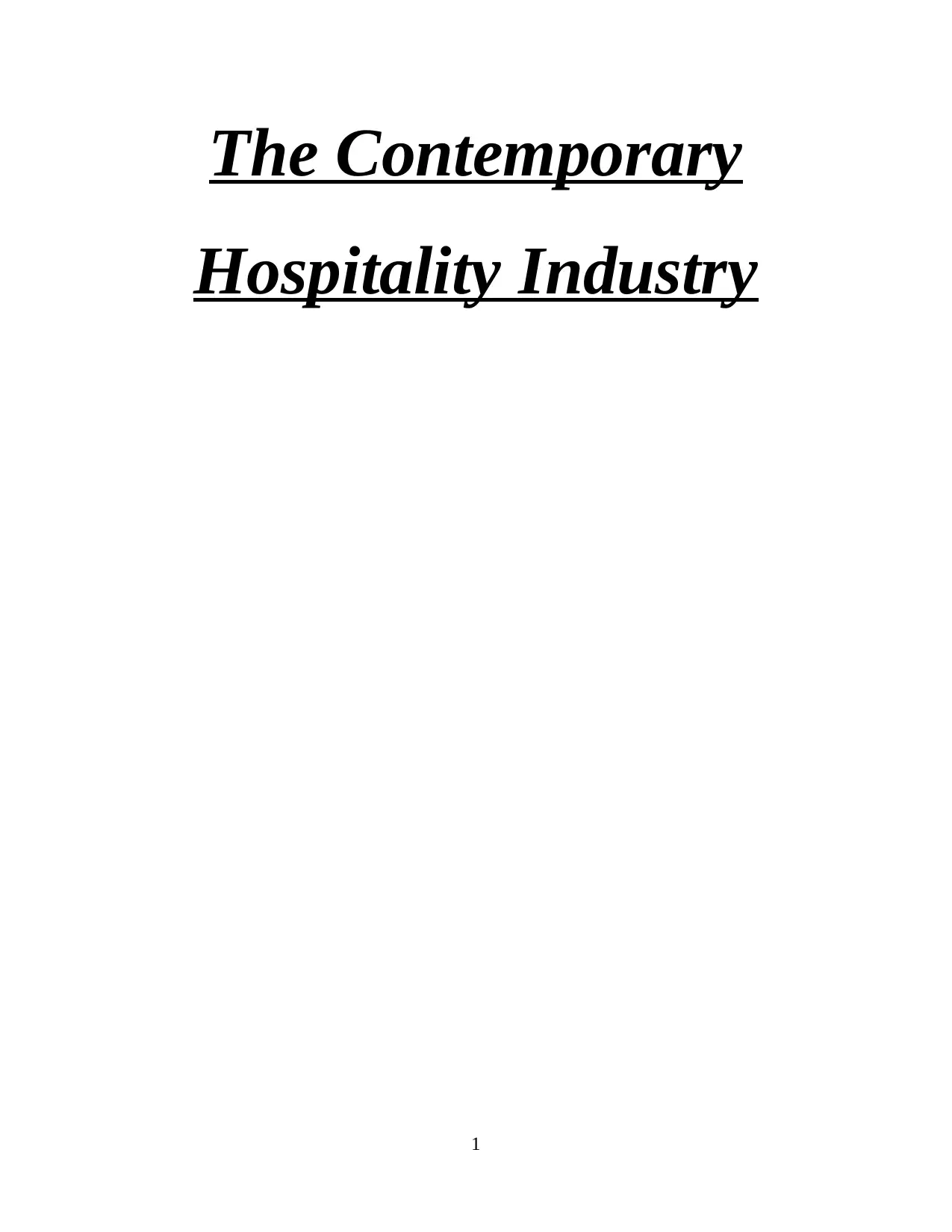
The Contemporary
Hospitality Industry
1
Hospitality Industry
1
Paraphrase This Document
Need a fresh take? Get an instant paraphrase of this document with our AI Paraphraser
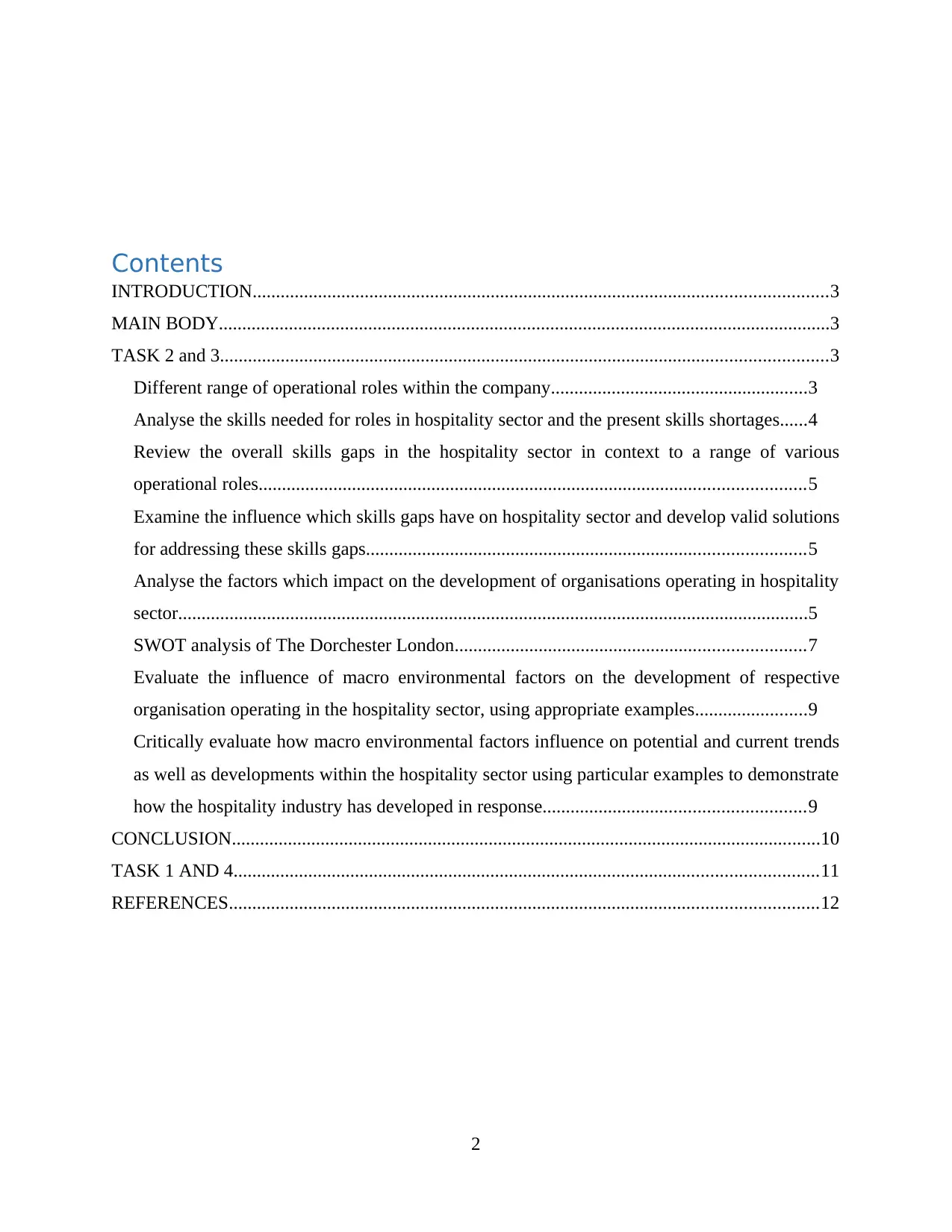
Contents
INTRODUCTION...........................................................................................................................3
MAIN BODY...................................................................................................................................3
TASK 2 and 3..................................................................................................................................3
Different range of operational roles within the company.......................................................3
Analyse the skills needed for roles in hospitality sector and the present skills shortages......4
Review the overall skills gaps in the hospitality sector in context to a range of various
operational roles.....................................................................................................................5
Examine the influence which skills gaps have on hospitality sector and develop valid solutions
for addressing these skills gaps..............................................................................................5
Analyse the factors which impact on the development of organisations operating in hospitality
sector.......................................................................................................................................5
SWOT analysis of The Dorchester London...........................................................................7
Evaluate the influence of macro environmental factors on the development of respective
organisation operating in the hospitality sector, using appropriate examples........................9
Critically evaluate how macro environmental factors influence on potential and current trends
as well as developments within the hospitality sector using particular examples to demonstrate
how the hospitality industry has developed in response........................................................9
CONCLUSION..............................................................................................................................10
TASK 1 AND 4.............................................................................................................................11
REFERENCES..............................................................................................................................12
2
INTRODUCTION...........................................................................................................................3
MAIN BODY...................................................................................................................................3
TASK 2 and 3..................................................................................................................................3
Different range of operational roles within the company.......................................................3
Analyse the skills needed for roles in hospitality sector and the present skills shortages......4
Review the overall skills gaps in the hospitality sector in context to a range of various
operational roles.....................................................................................................................5
Examine the influence which skills gaps have on hospitality sector and develop valid solutions
for addressing these skills gaps..............................................................................................5
Analyse the factors which impact on the development of organisations operating in hospitality
sector.......................................................................................................................................5
SWOT analysis of The Dorchester London...........................................................................7
Evaluate the influence of macro environmental factors on the development of respective
organisation operating in the hospitality sector, using appropriate examples........................9
Critically evaluate how macro environmental factors influence on potential and current trends
as well as developments within the hospitality sector using particular examples to demonstrate
how the hospitality industry has developed in response........................................................9
CONCLUSION..............................................................................................................................10
TASK 1 AND 4.............................................................................................................................11
REFERENCES..............................................................................................................................12
2
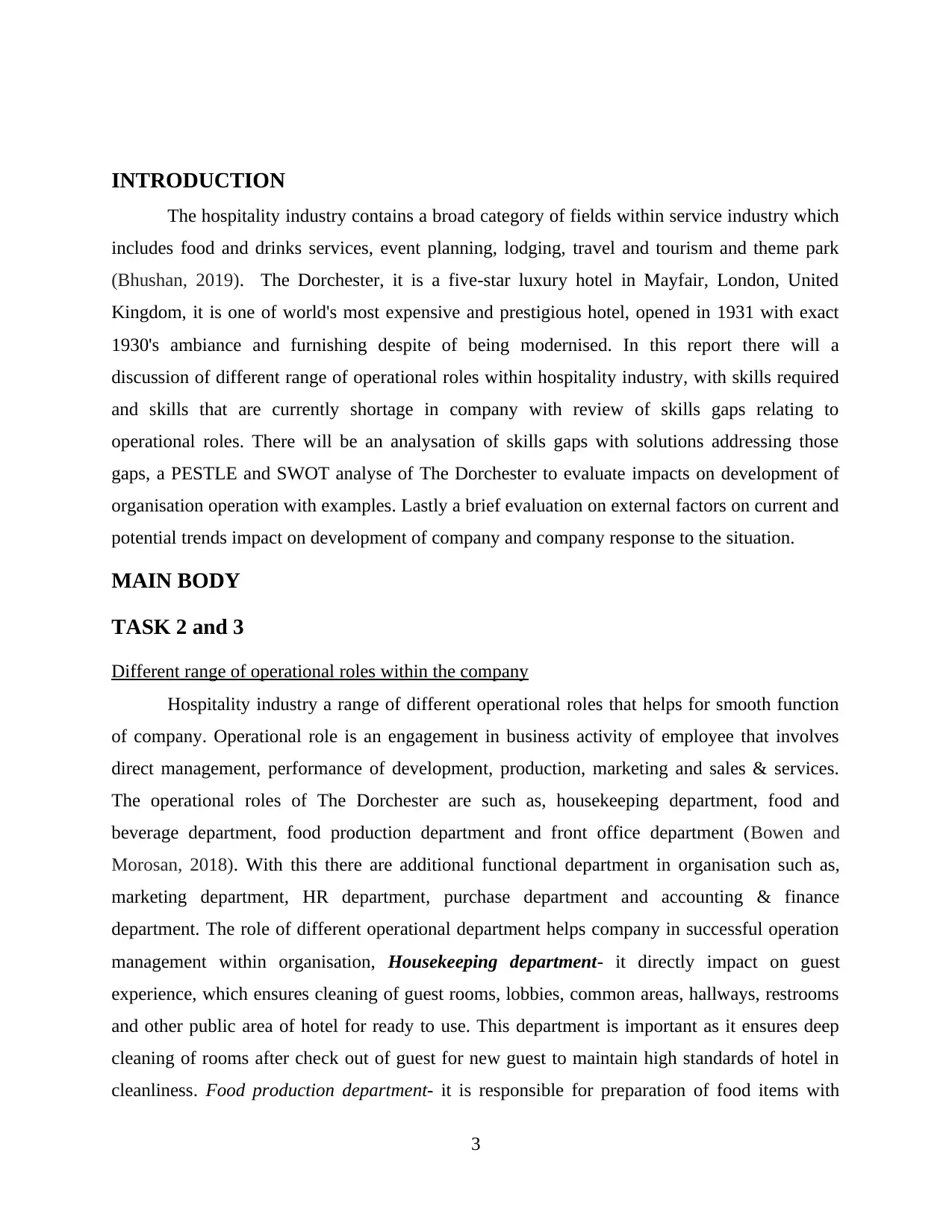
INTRODUCTION
The hospitality industry contains a broad category of fields within service industry which
includes food and drinks services, event planning, lodging, travel and tourism and theme park
(Bhushan, 2019). The Dorchester, it is a five-star luxury hotel in Mayfair, London, United
Kingdom, it is one of world's most expensive and prestigious hotel, opened in 1931 with exact
1930's ambiance and furnishing despite of being modernised. In this report there will a
discussion of different range of operational roles within hospitality industry, with skills required
and skills that are currently shortage in company with review of skills gaps relating to
operational roles. There will be an analysation of skills gaps with solutions addressing those
gaps, a PESTLE and SWOT analyse of The Dorchester to evaluate impacts on development of
organisation operation with examples. Lastly a brief evaluation on external factors on current and
potential trends impact on development of company and company response to the situation.
MAIN BODY
TASK 2 and 3
Different range of operational roles within the company
Hospitality industry a range of different operational roles that helps for smooth function
of company. Operational role is an engagement in business activity of employee that involves
direct management, performance of development, production, marketing and sales & services.
The operational roles of The Dorchester are such as, housekeeping department, food and
beverage department, food production department and front office department (Bowen and
Morosan, 2018). With this there are additional functional department in organisation such as,
marketing department, HR department, purchase department and accounting & finance
department. The role of different operational department helps company in successful operation
management within organisation, Housekeeping department- it directly impact on guest
experience, which ensures cleaning of guest rooms, lobbies, common areas, hallways, restrooms
and other public area of hotel for ready to use. This department is important as it ensures deep
cleaning of rooms after check out of guest for new guest to maintain high standards of hotel in
cleanliness. Food production department- it is responsible for preparation of food items with
3
The hospitality industry contains a broad category of fields within service industry which
includes food and drinks services, event planning, lodging, travel and tourism and theme park
(Bhushan, 2019). The Dorchester, it is a five-star luxury hotel in Mayfair, London, United
Kingdom, it is one of world's most expensive and prestigious hotel, opened in 1931 with exact
1930's ambiance and furnishing despite of being modernised. In this report there will a
discussion of different range of operational roles within hospitality industry, with skills required
and skills that are currently shortage in company with review of skills gaps relating to
operational roles. There will be an analysation of skills gaps with solutions addressing those
gaps, a PESTLE and SWOT analyse of The Dorchester to evaluate impacts on development of
organisation operation with examples. Lastly a brief evaluation on external factors on current and
potential trends impact on development of company and company response to the situation.
MAIN BODY
TASK 2 and 3
Different range of operational roles within the company
Hospitality industry a range of different operational roles that helps for smooth function
of company. Operational role is an engagement in business activity of employee that involves
direct management, performance of development, production, marketing and sales & services.
The operational roles of The Dorchester are such as, housekeeping department, food and
beverage department, food production department and front office department (Bowen and
Morosan, 2018). With this there are additional functional department in organisation such as,
marketing department, HR department, purchase department and accounting & finance
department. The role of different operational department helps company in successful operation
management within organisation, Housekeeping department- it directly impact on guest
experience, which ensures cleaning of guest rooms, lobbies, common areas, hallways, restrooms
and other public area of hotel for ready to use. This department is important as it ensures deep
cleaning of rooms after check out of guest for new guest to maintain high standards of hotel in
cleanliness. Food production department- it is responsible for preparation of food items with
3
⊘ This is a preview!⊘
Do you want full access?
Subscribe today to unlock all pages.

Trusted by 1+ million students worldwide
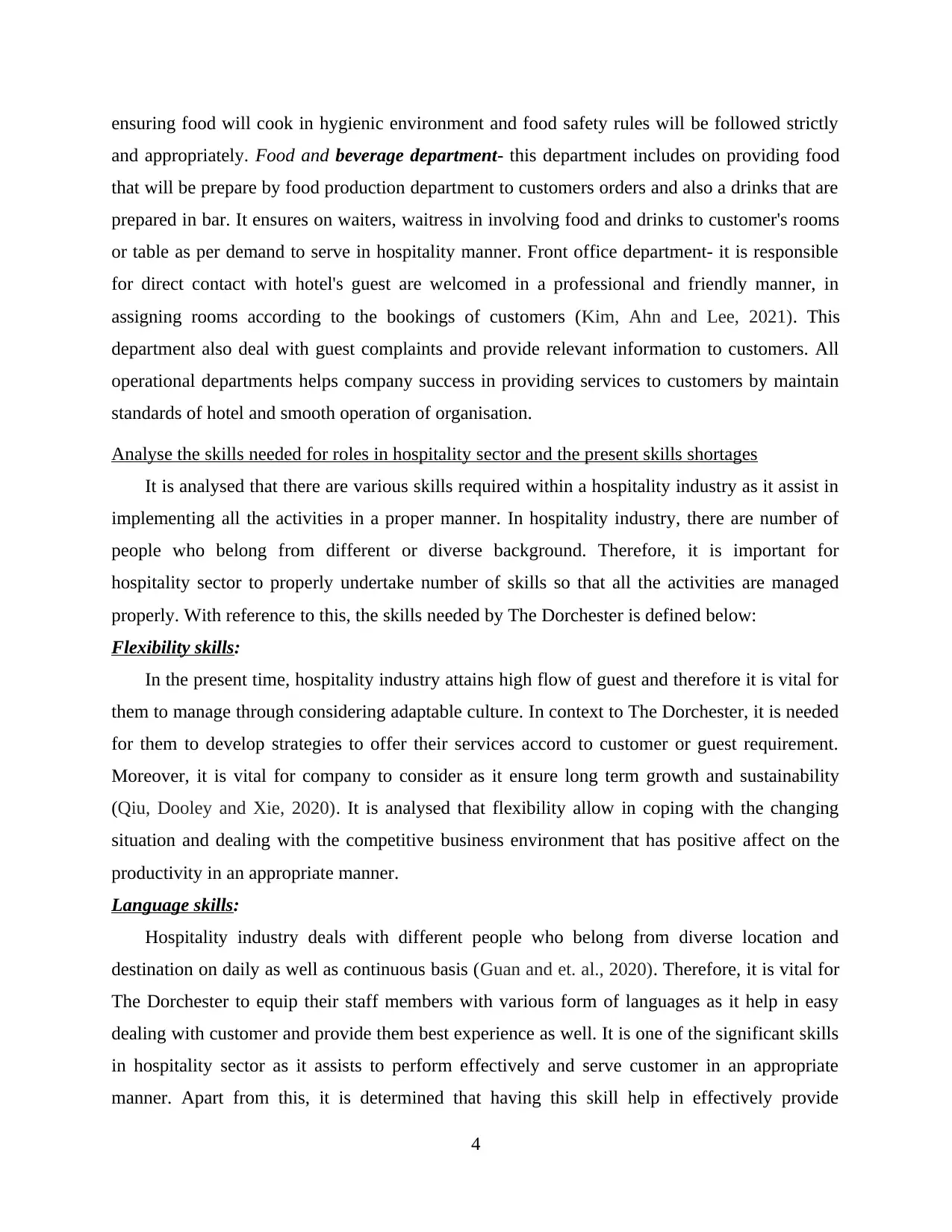
ensuring food will cook in hygienic environment and food safety rules will be followed strictly
and appropriately. Food and beverage department- this department includes on providing food
that will be prepare by food production department to customers orders and also a drinks that are
prepared in bar. It ensures on waiters, waitress in involving food and drinks to customer's rooms
or table as per demand to serve in hospitality manner. Front office department- it is responsible
for direct contact with hotel's guest are welcomed in a professional and friendly manner, in
assigning rooms according to the bookings of customers (Kim, Ahn and Lee, 2021). This
department also deal with guest complaints and provide relevant information to customers. All
operational departments helps company success in providing services to customers by maintain
standards of hotel and smooth operation of organisation.
Analyse the skills needed for roles in hospitality sector and the present skills shortages
It is analysed that there are various skills required within a hospitality industry as it assist in
implementing all the activities in a proper manner. In hospitality industry, there are number of
people who belong from different or diverse background. Therefore, it is important for
hospitality sector to properly undertake number of skills so that all the activities are managed
properly. With reference to this, the skills needed by The Dorchester is defined below:
Flexibility skills:
In the present time, hospitality industry attains high flow of guest and therefore it is vital for
them to manage through considering adaptable culture. In context to The Dorchester, it is needed
for them to develop strategies to offer their services accord to customer or guest requirement.
Moreover, it is vital for company to consider as it ensure long term growth and sustainability
(Qiu, Dooley and Xie, 2020). It is analysed that flexibility allow in coping with the changing
situation and dealing with the competitive business environment that has positive affect on the
productivity in an appropriate manner.
Language skills:
Hospitality industry deals with different people who belong from diverse location and
destination on daily as well as continuous basis (Guan and et. al., 2020). Therefore, it is vital for
The Dorchester to equip their staff members with various form of languages as it help in easy
dealing with customer and provide them best experience as well. It is one of the significant skills
in hospitality sector as it assists to perform effectively and serve customer in an appropriate
manner. Apart from this, it is determined that having this skill help in effectively provide
4
and appropriately. Food and beverage department- this department includes on providing food
that will be prepare by food production department to customers orders and also a drinks that are
prepared in bar. It ensures on waiters, waitress in involving food and drinks to customer's rooms
or table as per demand to serve in hospitality manner. Front office department- it is responsible
for direct contact with hotel's guest are welcomed in a professional and friendly manner, in
assigning rooms according to the bookings of customers (Kim, Ahn and Lee, 2021). This
department also deal with guest complaints and provide relevant information to customers. All
operational departments helps company success in providing services to customers by maintain
standards of hotel and smooth operation of organisation.
Analyse the skills needed for roles in hospitality sector and the present skills shortages
It is analysed that there are various skills required within a hospitality industry as it assist in
implementing all the activities in a proper manner. In hospitality industry, there are number of
people who belong from different or diverse background. Therefore, it is important for
hospitality sector to properly undertake number of skills so that all the activities are managed
properly. With reference to this, the skills needed by The Dorchester is defined below:
Flexibility skills:
In the present time, hospitality industry attains high flow of guest and therefore it is vital for
them to manage through considering adaptable culture. In context to The Dorchester, it is needed
for them to develop strategies to offer their services accord to customer or guest requirement.
Moreover, it is vital for company to consider as it ensure long term growth and sustainability
(Qiu, Dooley and Xie, 2020). It is analysed that flexibility allow in coping with the changing
situation and dealing with the competitive business environment that has positive affect on the
productivity in an appropriate manner.
Language skills:
Hospitality industry deals with different people who belong from diverse location and
destination on daily as well as continuous basis (Guan and et. al., 2020). Therefore, it is vital for
The Dorchester to equip their staff members with various form of languages as it help in easy
dealing with customer and provide them best experience as well. It is one of the significant skills
in hospitality sector as it assists to perform effectively and serve customer in an appropriate
manner. Apart from this, it is determined that having this skill help in effectively provide
4
Paraphrase This Document
Need a fresh take? Get an instant paraphrase of this document with our AI Paraphraser
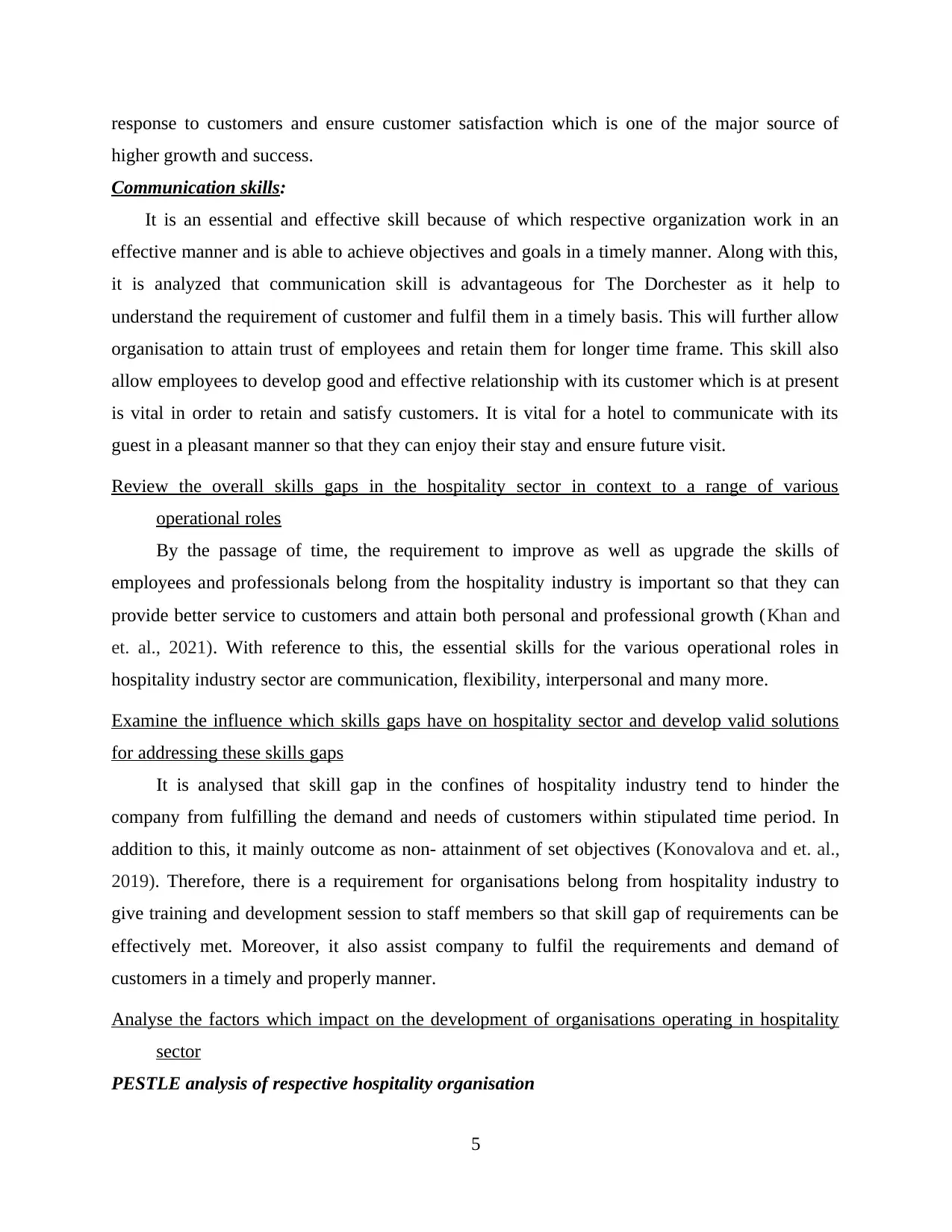
response to customers and ensure customer satisfaction which is one of the major source of
higher growth and success.
Communication skills:
It is an essential and effective skill because of which respective organization work in an
effective manner and is able to achieve objectives and goals in a timely manner. Along with this,
it is analyzed that communication skill is advantageous for The Dorchester as it help to
understand the requirement of customer and fulfil them in a timely basis. This will further allow
organisation to attain trust of employees and retain them for longer time frame. This skill also
allow employees to develop good and effective relationship with its customer which is at present
is vital in order to retain and satisfy customers. It is vital for a hotel to communicate with its
guest in a pleasant manner so that they can enjoy their stay and ensure future visit.
Review the overall skills gaps in the hospitality sector in context to a range of various
operational roles
By the passage of time, the requirement to improve as well as upgrade the skills of
employees and professionals belong from the hospitality industry is important so that they can
provide better service to customers and attain both personal and professional growth (Khan and
et. al., 2021). With reference to this, the essential skills for the various operational roles in
hospitality industry sector are communication, flexibility, interpersonal and many more.
Examine the influence which skills gaps have on hospitality sector and develop valid solutions
for addressing these skills gaps
It is analysed that skill gap in the confines of hospitality industry tend to hinder the
company from fulfilling the demand and needs of customers within stipulated time period. In
addition to this, it mainly outcome as non- attainment of set objectives (Konovalova and et. al.,
2019). Therefore, there is a requirement for organisations belong from hospitality industry to
give training and development session to staff members so that skill gap of requirements can be
effectively met. Moreover, it also assist company to fulfil the requirements and demand of
customers in a timely and properly manner.
Analyse the factors which impact on the development of organisations operating in hospitality
sector
PESTLE analysis of respective hospitality organisation
5
higher growth and success.
Communication skills:
It is an essential and effective skill because of which respective organization work in an
effective manner and is able to achieve objectives and goals in a timely manner. Along with this,
it is analyzed that communication skill is advantageous for The Dorchester as it help to
understand the requirement of customer and fulfil them in a timely basis. This will further allow
organisation to attain trust of employees and retain them for longer time frame. This skill also
allow employees to develop good and effective relationship with its customer which is at present
is vital in order to retain and satisfy customers. It is vital for a hotel to communicate with its
guest in a pleasant manner so that they can enjoy their stay and ensure future visit.
Review the overall skills gaps in the hospitality sector in context to a range of various
operational roles
By the passage of time, the requirement to improve as well as upgrade the skills of
employees and professionals belong from the hospitality industry is important so that they can
provide better service to customers and attain both personal and professional growth (Khan and
et. al., 2021). With reference to this, the essential skills for the various operational roles in
hospitality industry sector are communication, flexibility, interpersonal and many more.
Examine the influence which skills gaps have on hospitality sector and develop valid solutions
for addressing these skills gaps
It is analysed that skill gap in the confines of hospitality industry tend to hinder the
company from fulfilling the demand and needs of customers within stipulated time period. In
addition to this, it mainly outcome as non- attainment of set objectives (Konovalova and et. al.,
2019). Therefore, there is a requirement for organisations belong from hospitality industry to
give training and development session to staff members so that skill gap of requirements can be
effectively met. Moreover, it also assist company to fulfil the requirements and demand of
customers in a timely and properly manner.
Analyse the factors which impact on the development of organisations operating in hospitality
sector
PESTLE analysis of respective hospitality organisation
5
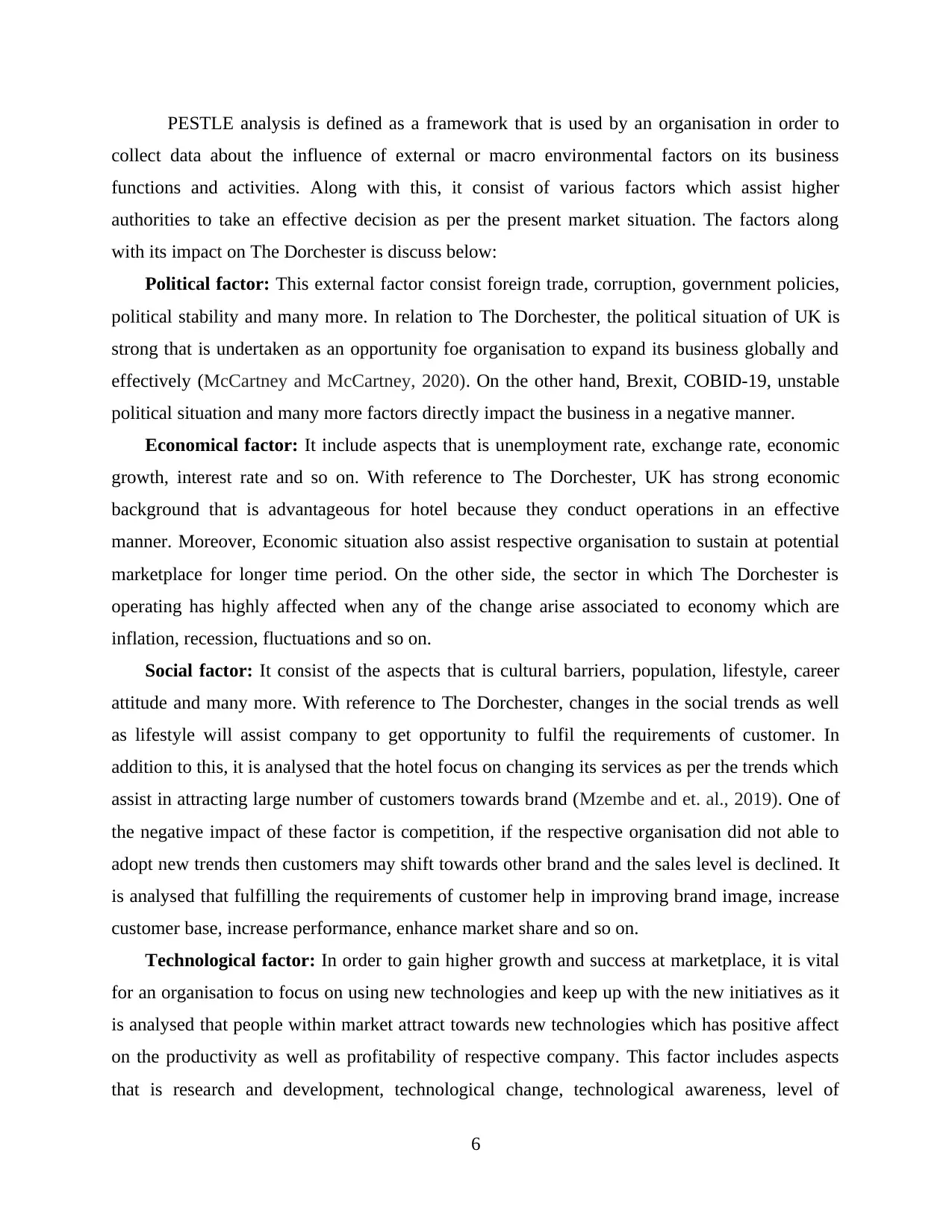
PESTLE analysis is defined as a framework that is used by an organisation in order to
collect data about the influence of external or macro environmental factors on its business
functions and activities. Along with this, it consist of various factors which assist higher
authorities to take an effective decision as per the present market situation. The factors along
with its impact on The Dorchester is discuss below:
Political factor: This external factor consist foreign trade, corruption, government policies,
political stability and many more. In relation to The Dorchester, the political situation of UK is
strong that is undertaken as an opportunity foe organisation to expand its business globally and
effectively (McCartney and McCartney, 2020). On the other hand, Brexit, COBID-19, unstable
political situation and many more factors directly impact the business in a negative manner.
Economical factor: It include aspects that is unemployment rate, exchange rate, economic
growth, interest rate and so on. With reference to The Dorchester, UK has strong economic
background that is advantageous for hotel because they conduct operations in an effective
manner. Moreover, Economic situation also assist respective organisation to sustain at potential
marketplace for longer time period. On the other side, the sector in which The Dorchester is
operating has highly affected when any of the change arise associated to economy which are
inflation, recession, fluctuations and so on.
Social factor: It consist of the aspects that is cultural barriers, population, lifestyle, career
attitude and many more. With reference to The Dorchester, changes in the social trends as well
as lifestyle will assist company to get opportunity to fulfil the requirements of customer. In
addition to this, it is analysed that the hotel focus on changing its services as per the trends which
assist in attracting large number of customers towards brand (Mzembe and et. al., 2019). One of
the negative impact of these factor is competition, if the respective organisation did not able to
adopt new trends then customers may shift towards other brand and the sales level is declined. It
is analysed that fulfilling the requirements of customer help in improving brand image, increase
customer base, increase performance, enhance market share and so on.
Technological factor: In order to gain higher growth and success at marketplace, it is vital
for an organisation to focus on using new technologies and keep up with the new initiatives as it
is analysed that people within market attract towards new technologies which has positive affect
on the productivity as well as profitability of respective company. This factor includes aspects
that is research and development, technological change, technological awareness, level of
6
collect data about the influence of external or macro environmental factors on its business
functions and activities. Along with this, it consist of various factors which assist higher
authorities to take an effective decision as per the present market situation. The factors along
with its impact on The Dorchester is discuss below:
Political factor: This external factor consist foreign trade, corruption, government policies,
political stability and many more. In relation to The Dorchester, the political situation of UK is
strong that is undertaken as an opportunity foe organisation to expand its business globally and
effectively (McCartney and McCartney, 2020). On the other hand, Brexit, COBID-19, unstable
political situation and many more factors directly impact the business in a negative manner.
Economical factor: It include aspects that is unemployment rate, exchange rate, economic
growth, interest rate and so on. With reference to The Dorchester, UK has strong economic
background that is advantageous for hotel because they conduct operations in an effective
manner. Moreover, Economic situation also assist respective organisation to sustain at potential
marketplace for longer time period. On the other side, the sector in which The Dorchester is
operating has highly affected when any of the change arise associated to economy which are
inflation, recession, fluctuations and so on.
Social factor: It consist of the aspects that is cultural barriers, population, lifestyle, career
attitude and many more. With reference to The Dorchester, changes in the social trends as well
as lifestyle will assist company to get opportunity to fulfil the requirements of customer. In
addition to this, it is analysed that the hotel focus on changing its services as per the trends which
assist in attracting large number of customers towards brand (Mzembe and et. al., 2019). One of
the negative impact of these factor is competition, if the respective organisation did not able to
adopt new trends then customers may shift towards other brand and the sales level is declined. It
is analysed that fulfilling the requirements of customer help in improving brand image, increase
customer base, increase performance, enhance market share and so on.
Technological factor: In order to gain higher growth and success at marketplace, it is vital
for an organisation to focus on using new technologies and keep up with the new initiatives as it
is analysed that people within market attract towards new technologies which has positive affect
on the productivity as well as profitability of respective company. This factor includes aspects
that is research and development, technological change, technological awareness, level of
6
⊘ This is a preview!⊘
Do you want full access?
Subscribe today to unlock all pages.

Trusted by 1+ million students worldwide
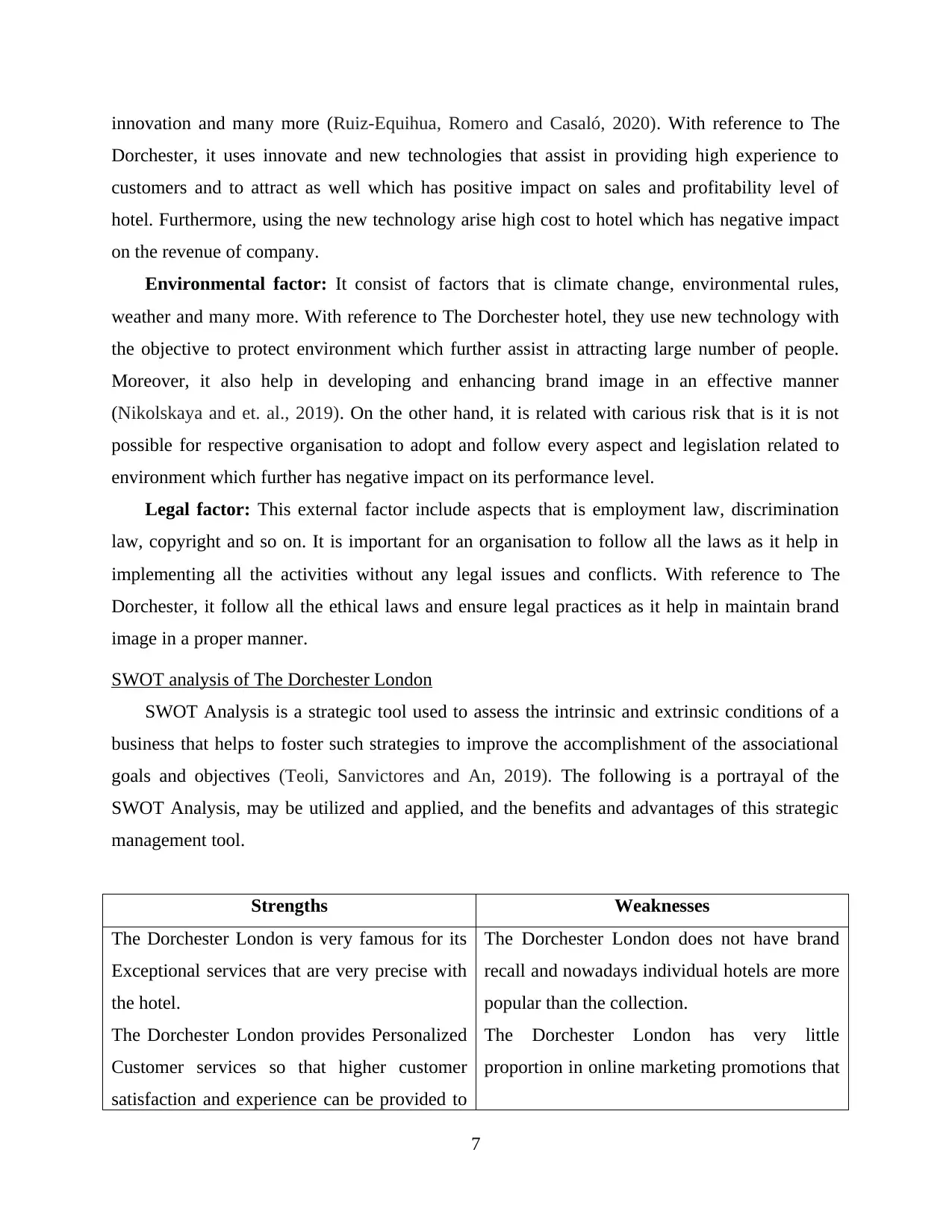
innovation and many more (Ruiz-Equihua, Romero and Casaló, 2020). With reference to The
Dorchester, it uses innovate and new technologies that assist in providing high experience to
customers and to attract as well which has positive impact on sales and profitability level of
hotel. Furthermore, using the new technology arise high cost to hotel which has negative impact
on the revenue of company.
Environmental factor: It consist of factors that is climate change, environmental rules,
weather and many more. With reference to The Dorchester hotel, they use new technology with
the objective to protect environment which further assist in attracting large number of people.
Moreover, it also help in developing and enhancing brand image in an effective manner
(Nikolskaya and et. al., 2019). On the other hand, it is related with carious risk that is it is not
possible for respective organisation to adopt and follow every aspect and legislation related to
environment which further has negative impact on its performance level.
Legal factor: This external factor include aspects that is employment law, discrimination
law, copyright and so on. It is important for an organisation to follow all the laws as it help in
implementing all the activities without any legal issues and conflicts. With reference to The
Dorchester, it follow all the ethical laws and ensure legal practices as it help in maintain brand
image in a proper manner.
SWOT analysis of The Dorchester London
SWOT Analysis is a strategic tool used to assess the intrinsic and extrinsic conditions of a
business that helps to foster such strategies to improve the accomplishment of the associational
goals and objectives (Teoli, Sanvictores and An, 2019). The following is a portrayal of the
SWOT Analysis, may be utilized and applied, and the benefits and advantages of this strategic
management tool.
Strengths Weaknesses
The Dorchester London is very famous for its
Exceptional services that are very precise with
the hotel.
The Dorchester London provides Personalized
Customer services so that higher customer
satisfaction and experience can be provided to
The Dorchester London does not have brand
recall and nowadays individual hotels are more
popular than the collection.
The Dorchester London has very little
proportion in online marketing promotions that
7
Dorchester, it uses innovate and new technologies that assist in providing high experience to
customers and to attract as well which has positive impact on sales and profitability level of
hotel. Furthermore, using the new technology arise high cost to hotel which has negative impact
on the revenue of company.
Environmental factor: It consist of factors that is climate change, environmental rules,
weather and many more. With reference to The Dorchester hotel, they use new technology with
the objective to protect environment which further assist in attracting large number of people.
Moreover, it also help in developing and enhancing brand image in an effective manner
(Nikolskaya and et. al., 2019). On the other hand, it is related with carious risk that is it is not
possible for respective organisation to adopt and follow every aspect and legislation related to
environment which further has negative impact on its performance level.
Legal factor: This external factor include aspects that is employment law, discrimination
law, copyright and so on. It is important for an organisation to follow all the laws as it help in
implementing all the activities without any legal issues and conflicts. With reference to The
Dorchester, it follow all the ethical laws and ensure legal practices as it help in maintain brand
image in a proper manner.
SWOT analysis of The Dorchester London
SWOT Analysis is a strategic tool used to assess the intrinsic and extrinsic conditions of a
business that helps to foster such strategies to improve the accomplishment of the associational
goals and objectives (Teoli, Sanvictores and An, 2019). The following is a portrayal of the
SWOT Analysis, may be utilized and applied, and the benefits and advantages of this strategic
management tool.
Strengths Weaknesses
The Dorchester London is very famous for its
Exceptional services that are very precise with
the hotel.
The Dorchester London provides Personalized
Customer services so that higher customer
satisfaction and experience can be provided to
The Dorchester London does not have brand
recall and nowadays individual hotels are more
popular than the collection.
The Dorchester London has very little
proportion in online marketing promotions that
7
Paraphrase This Document
Need a fresh take? Get an instant paraphrase of this document with our AI Paraphraser
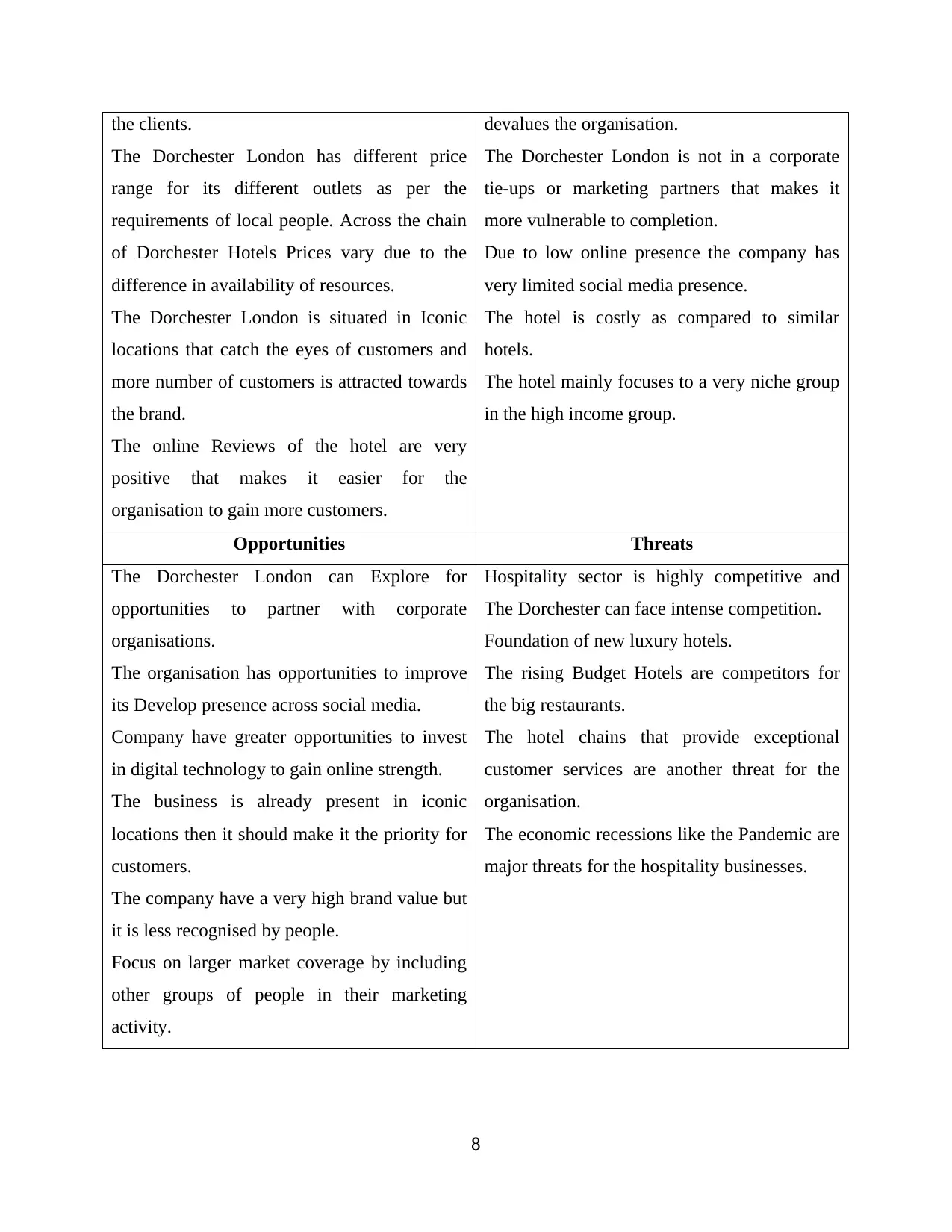
the clients.
The Dorchester London has different price
range for its different outlets as per the
requirements of local people. Across the chain
of Dorchester Hotels Prices vary due to the
difference in availability of resources.
The Dorchester London is situated in Iconic
locations that catch the eyes of customers and
more number of customers is attracted towards
the brand.
The online Reviews of the hotel are very
positive that makes it easier for the
organisation to gain more customers.
devalues the organisation.
The Dorchester London is not in a corporate
tie-ups or marketing partners that makes it
more vulnerable to completion.
Due to low online presence the company has
very limited social media presence.
The hotel is costly as compared to similar
hotels.
The hotel mainly focuses to a very niche group
in the high income group.
Opportunities Threats
The Dorchester London can Explore for
opportunities to partner with corporate
organisations.
The organisation has opportunities to improve
its Develop presence across social media.
Company have greater opportunities to invest
in digital technology to gain online strength.
The business is already present in iconic
locations then it should make it the priority for
customers.
The company have a very high brand value but
it is less recognised by people.
Focus on larger market coverage by including
other groups of people in their marketing
activity.
Hospitality sector is highly competitive and
The Dorchester can face intense competition.
Foundation of new luxury hotels.
The rising Budget Hotels are competitors for
the big restaurants.
The hotel chains that provide exceptional
customer services are another threat for the
organisation.
The economic recessions like the Pandemic are
major threats for the hospitality businesses.
8
The Dorchester London has different price
range for its different outlets as per the
requirements of local people. Across the chain
of Dorchester Hotels Prices vary due to the
difference in availability of resources.
The Dorchester London is situated in Iconic
locations that catch the eyes of customers and
more number of customers is attracted towards
the brand.
The online Reviews of the hotel are very
positive that makes it easier for the
organisation to gain more customers.
devalues the organisation.
The Dorchester London is not in a corporate
tie-ups or marketing partners that makes it
more vulnerable to completion.
Due to low online presence the company has
very limited social media presence.
The hotel is costly as compared to similar
hotels.
The hotel mainly focuses to a very niche group
in the high income group.
Opportunities Threats
The Dorchester London can Explore for
opportunities to partner with corporate
organisations.
The organisation has opportunities to improve
its Develop presence across social media.
Company have greater opportunities to invest
in digital technology to gain online strength.
The business is already present in iconic
locations then it should make it the priority for
customers.
The company have a very high brand value but
it is less recognised by people.
Focus on larger market coverage by including
other groups of people in their marketing
activity.
Hospitality sector is highly competitive and
The Dorchester can face intense competition.
Foundation of new luxury hotels.
The rising Budget Hotels are competitors for
the big restaurants.
The hotel chains that provide exceptional
customer services are another threat for the
organisation.
The economic recessions like the Pandemic are
major threats for the hospitality businesses.
8
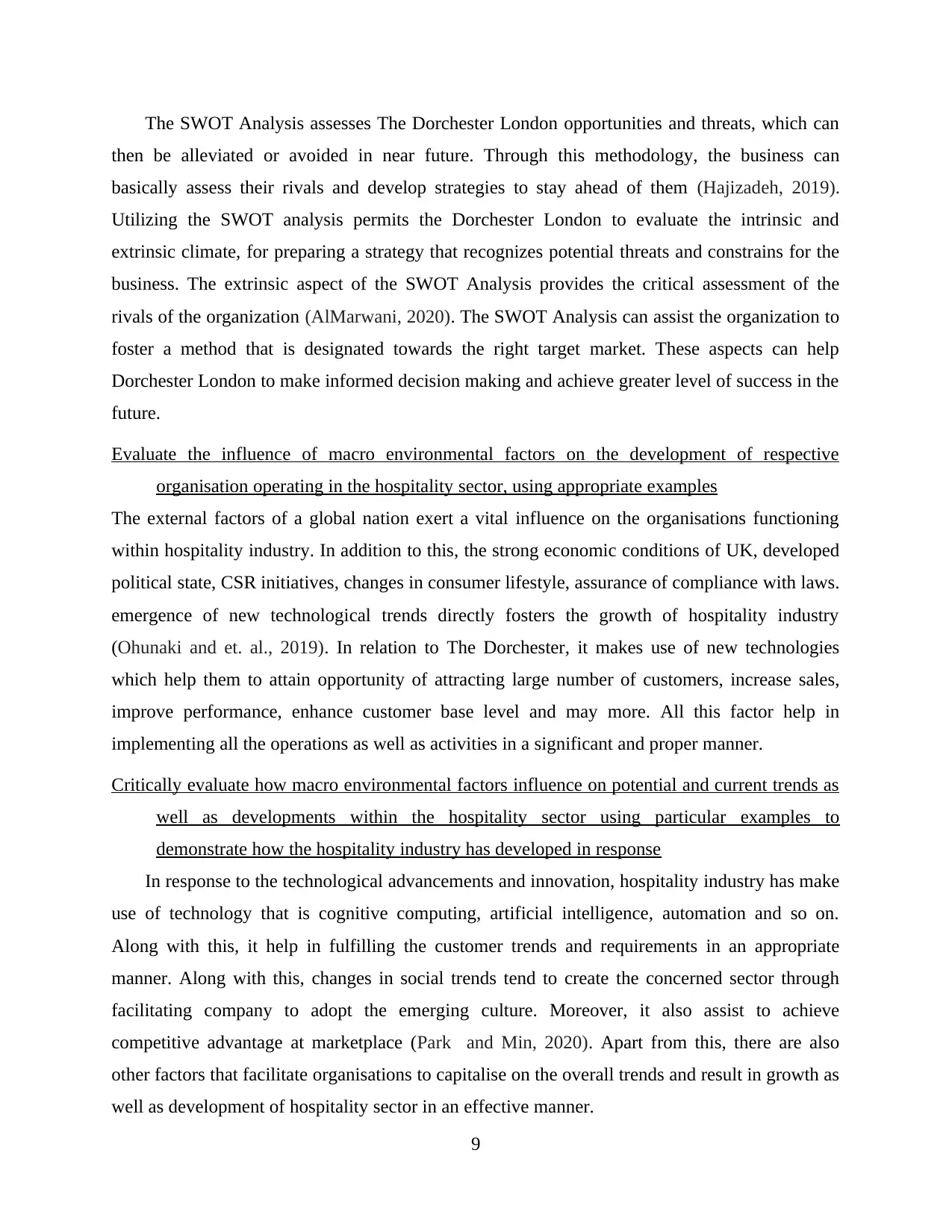
The SWOT Analysis assesses The Dorchester London opportunities and threats, which can
then be alleviated or avoided in near future. Through this methodology, the business can
basically assess their rivals and develop strategies to stay ahead of them (Hajizadeh, 2019).
Utilizing the SWOT analysis permits the Dorchester London to evaluate the intrinsic and
extrinsic climate, for preparing a strategy that recognizes potential threats and constrains for the
business. The extrinsic aspect of the SWOT Analysis provides the critical assessment of the
rivals of the organization (AlMarwani, 2020). The SWOT Analysis can assist the organization to
foster a method that is designated towards the right target market. These aspects can help
Dorchester London to make informed decision making and achieve greater level of success in the
future.
Evaluate the influence of macro environmental factors on the development of respective
organisation operating in the hospitality sector, using appropriate examples
The external factors of a global nation exert a vital influence on the organisations functioning
within hospitality industry. In addition to this, the strong economic conditions of UK, developed
political state, CSR initiatives, changes in consumer lifestyle, assurance of compliance with laws.
emergence of new technological trends directly fosters the growth of hospitality industry
(Ohunaki and et. al., 2019). In relation to The Dorchester, it makes use of new technologies
which help them to attain opportunity of attracting large number of customers, increase sales,
improve performance, enhance customer base level and may more. All this factor help in
implementing all the operations as well as activities in a significant and proper manner.
Critically evaluate how macro environmental factors influence on potential and current trends as
well as developments within the hospitality sector using particular examples to
demonstrate how the hospitality industry has developed in response
In response to the technological advancements and innovation, hospitality industry has make
use of technology that is cognitive computing, artificial intelligence, automation and so on.
Along with this, it help in fulfilling the customer trends and requirements in an appropriate
manner. Along with this, changes in social trends tend to create the concerned sector through
facilitating company to adopt the emerging culture. Moreover, it also assist to achieve
competitive advantage at marketplace (Park and Min, 2020). Apart from this, there are also
other factors that facilitate organisations to capitalise on the overall trends and result in growth as
well as development of hospitality sector in an effective manner.
9
then be alleviated or avoided in near future. Through this methodology, the business can
basically assess their rivals and develop strategies to stay ahead of them (Hajizadeh, 2019).
Utilizing the SWOT analysis permits the Dorchester London to evaluate the intrinsic and
extrinsic climate, for preparing a strategy that recognizes potential threats and constrains for the
business. The extrinsic aspect of the SWOT Analysis provides the critical assessment of the
rivals of the organization (AlMarwani, 2020). The SWOT Analysis can assist the organization to
foster a method that is designated towards the right target market. These aspects can help
Dorchester London to make informed decision making and achieve greater level of success in the
future.
Evaluate the influence of macro environmental factors on the development of respective
organisation operating in the hospitality sector, using appropriate examples
The external factors of a global nation exert a vital influence on the organisations functioning
within hospitality industry. In addition to this, the strong economic conditions of UK, developed
political state, CSR initiatives, changes in consumer lifestyle, assurance of compliance with laws.
emergence of new technological trends directly fosters the growth of hospitality industry
(Ohunaki and et. al., 2019). In relation to The Dorchester, it makes use of new technologies
which help them to attain opportunity of attracting large number of customers, increase sales,
improve performance, enhance customer base level and may more. All this factor help in
implementing all the operations as well as activities in a significant and proper manner.
Critically evaluate how macro environmental factors influence on potential and current trends as
well as developments within the hospitality sector using particular examples to
demonstrate how the hospitality industry has developed in response
In response to the technological advancements and innovation, hospitality industry has make
use of technology that is cognitive computing, artificial intelligence, automation and so on.
Along with this, it help in fulfilling the customer trends and requirements in an appropriate
manner. Along with this, changes in social trends tend to create the concerned sector through
facilitating company to adopt the emerging culture. Moreover, it also assist to achieve
competitive advantage at marketplace (Park and Min, 2020). Apart from this, there are also
other factors that facilitate organisations to capitalise on the overall trends and result in growth as
well as development of hospitality sector in an effective manner.
9
⊘ This is a preview!⊘
Do you want full access?
Subscribe today to unlock all pages.

Trusted by 1+ million students worldwide
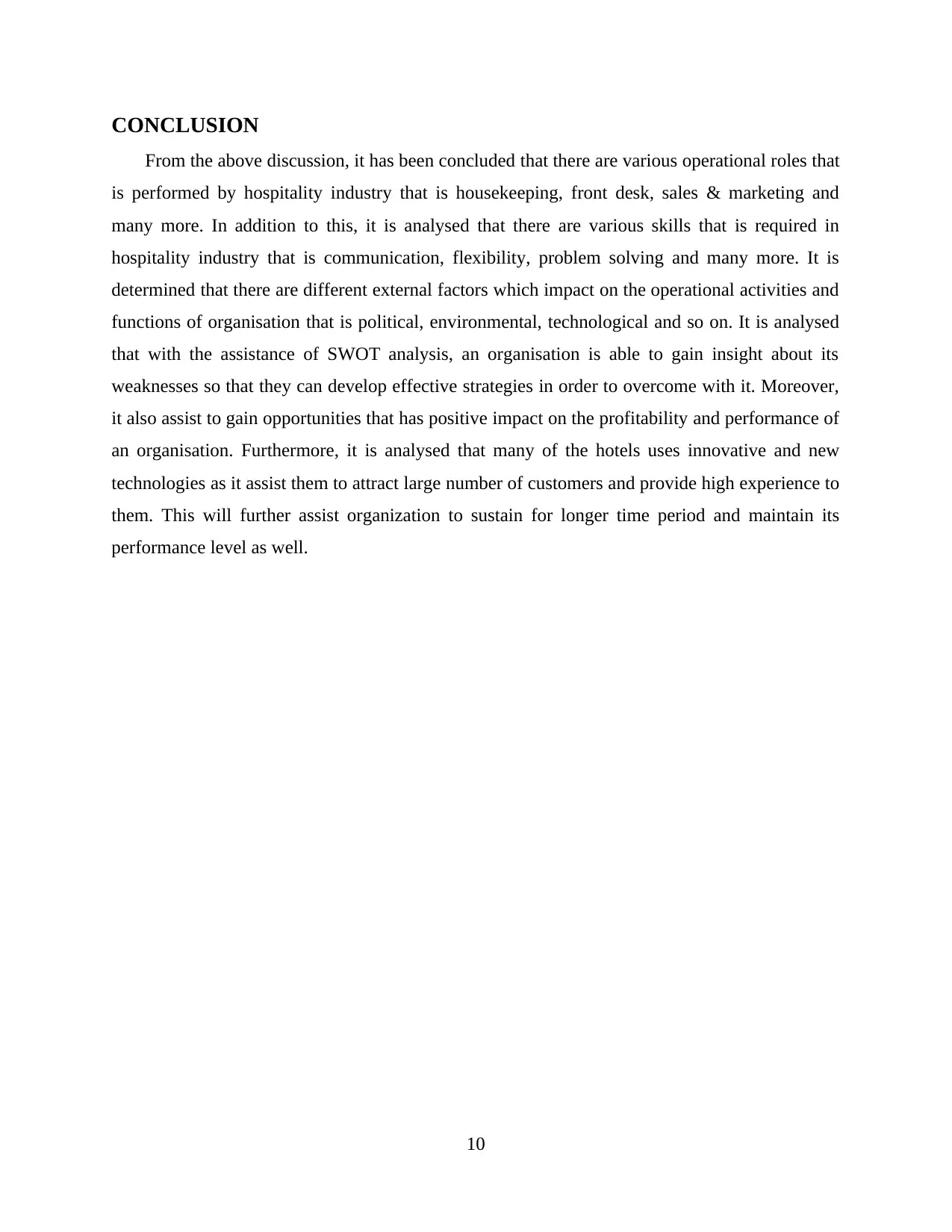
CONCLUSION
From the above discussion, it has been concluded that there are various operational roles that
is performed by hospitality industry that is housekeeping, front desk, sales & marketing and
many more. In addition to this, it is analysed that there are various skills that is required in
hospitality industry that is communication, flexibility, problem solving and many more. It is
determined that there are different external factors which impact on the operational activities and
functions of organisation that is political, environmental, technological and so on. It is analysed
that with the assistance of SWOT analysis, an organisation is able to gain insight about its
weaknesses so that they can develop effective strategies in order to overcome with it. Moreover,
it also assist to gain opportunities that has positive impact on the profitability and performance of
an organisation. Furthermore, it is analysed that many of the hotels uses innovative and new
technologies as it assist them to attract large number of customers and provide high experience to
them. This will further assist organization to sustain for longer time period and maintain its
performance level as well.
10
From the above discussion, it has been concluded that there are various operational roles that
is performed by hospitality industry that is housekeeping, front desk, sales & marketing and
many more. In addition to this, it is analysed that there are various skills that is required in
hospitality industry that is communication, flexibility, problem solving and many more. It is
determined that there are different external factors which impact on the operational activities and
functions of organisation that is political, environmental, technological and so on. It is analysed
that with the assistance of SWOT analysis, an organisation is able to gain insight about its
weaknesses so that they can develop effective strategies in order to overcome with it. Moreover,
it also assist to gain opportunities that has positive impact on the profitability and performance of
an organisation. Furthermore, it is analysed that many of the hotels uses innovative and new
technologies as it assist them to attract large number of customers and provide high experience to
them. This will further assist organization to sustain for longer time period and maintain its
performance level as well.
10
Paraphrase This Document
Need a fresh take? Get an instant paraphrase of this document with our AI Paraphraser
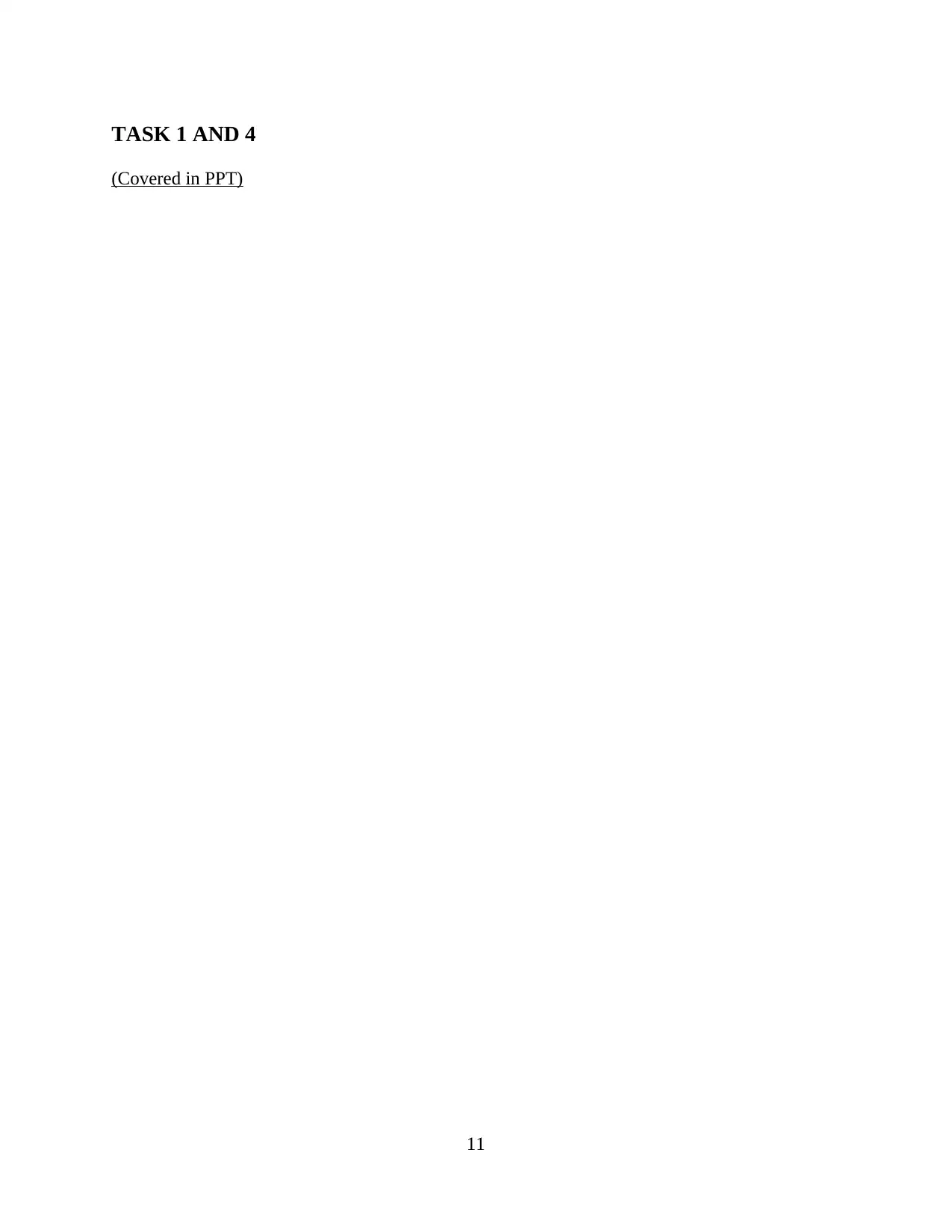
TASK 1 AND 4
(Covered in PPT)
11
(Covered in PPT)
11
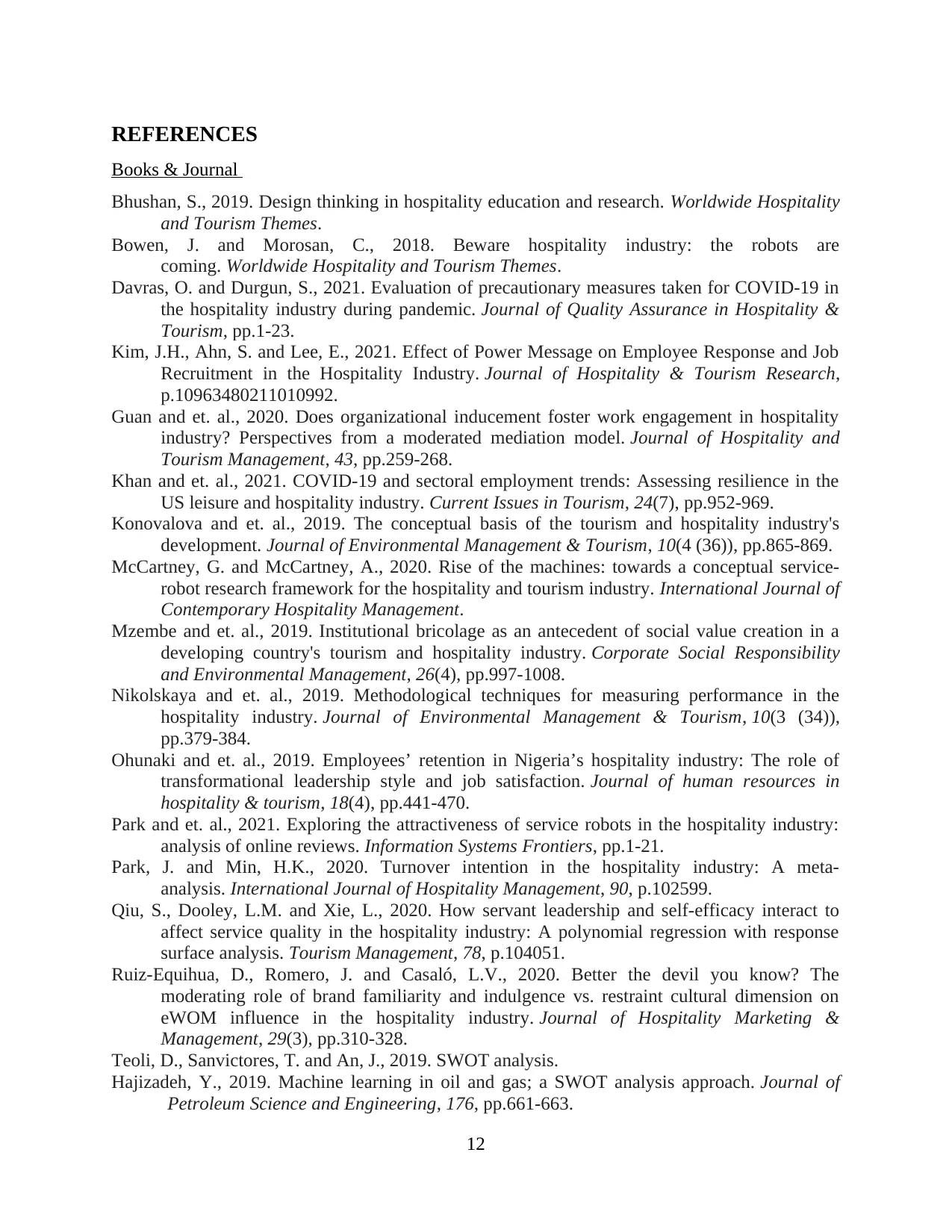
REFERENCES
Books & Journal
Bhushan, S., 2019. Design thinking in hospitality education and research. Worldwide Hospitality
and Tourism Themes.
Bowen, J. and Morosan, C., 2018. Beware hospitality industry: the robots are
coming. Worldwide Hospitality and Tourism Themes.
Davras, O. and Durgun, S., 2021. Evaluation of precautionary measures taken for COVID-19 in
the hospitality industry during pandemic. Journal of Quality Assurance in Hospitality &
Tourism, pp.1-23.
Kim, J.H., Ahn, S. and Lee, E., 2021. Effect of Power Message on Employee Response and Job
Recruitment in the Hospitality Industry. Journal of Hospitality & Tourism Research,
p.10963480211010992.
Guan and et. al., 2020. Does organizational inducement foster work engagement in hospitality
industry? Perspectives from a moderated mediation model. Journal of Hospitality and
Tourism Management, 43, pp.259-268.
Khan and et. al., 2021. COVID-19 and sectoral employment trends: Assessing resilience in the
US leisure and hospitality industry. Current Issues in Tourism, 24(7), pp.952-969.
Konovalova and et. al., 2019. The conceptual basis of the tourism and hospitality industry's
development. Journal of Environmental Management & Tourism, 10(4 (36)), pp.865-869.
McCartney, G. and McCartney, A., 2020. Rise of the machines: towards a conceptual service-
robot research framework for the hospitality and tourism industry. International Journal of
Contemporary Hospitality Management.
Mzembe and et. al., 2019. Institutional bricolage as an antecedent of social value creation in a
developing country's tourism and hospitality industry. Corporate Social Responsibility
and Environmental Management, 26(4), pp.997-1008.
Nikolskaya and et. al., 2019. Methodological techniques for measuring performance in the
hospitality industry. Journal of Environmental Management & Tourism, 10(3 (34)),
pp.379-384.
Ohunaki and et. al., 2019. Employees’ retention in Nigeria’s hospitality industry: The role of
transformational leadership style and job satisfaction. Journal of human resources in
hospitality & tourism, 18(4), pp.441-470.
Park and et. al., 2021. Exploring the attractiveness of service robots in the hospitality industry:
analysis of online reviews. Information Systems Frontiers, pp.1-21.
Park, J. and Min, H.K., 2020. Turnover intention in the hospitality industry: A meta-
analysis. International Journal of Hospitality Management, 90, p.102599.
Qiu, S., Dooley, L.M. and Xie, L., 2020. How servant leadership and self-efficacy interact to
affect service quality in the hospitality industry: A polynomial regression with response
surface analysis. Tourism Management, 78, p.104051.
Ruiz-Equihua, D., Romero, J. and Casaló, L.V., 2020. Better the devil you know? The
moderating role of brand familiarity and indulgence vs. restraint cultural dimension on
eWOM influence in the hospitality industry. Journal of Hospitality Marketing &
Management, 29(3), pp.310-328.
Teoli, D., Sanvictores, T. and An, J., 2019. SWOT analysis.
Hajizadeh, Y., 2019. Machine learning in oil and gas; a SWOT analysis approach. Journal of
Petroleum Science and Engineering, 176, pp.661-663.
12
Books & Journal
Bhushan, S., 2019. Design thinking in hospitality education and research. Worldwide Hospitality
and Tourism Themes.
Bowen, J. and Morosan, C., 2018. Beware hospitality industry: the robots are
coming. Worldwide Hospitality and Tourism Themes.
Davras, O. and Durgun, S., 2021. Evaluation of precautionary measures taken for COVID-19 in
the hospitality industry during pandemic. Journal of Quality Assurance in Hospitality &
Tourism, pp.1-23.
Kim, J.H., Ahn, S. and Lee, E., 2021. Effect of Power Message on Employee Response and Job
Recruitment in the Hospitality Industry. Journal of Hospitality & Tourism Research,
p.10963480211010992.
Guan and et. al., 2020. Does organizational inducement foster work engagement in hospitality
industry? Perspectives from a moderated mediation model. Journal of Hospitality and
Tourism Management, 43, pp.259-268.
Khan and et. al., 2021. COVID-19 and sectoral employment trends: Assessing resilience in the
US leisure and hospitality industry. Current Issues in Tourism, 24(7), pp.952-969.
Konovalova and et. al., 2019. The conceptual basis of the tourism and hospitality industry's
development. Journal of Environmental Management & Tourism, 10(4 (36)), pp.865-869.
McCartney, G. and McCartney, A., 2020. Rise of the machines: towards a conceptual service-
robot research framework for the hospitality and tourism industry. International Journal of
Contemporary Hospitality Management.
Mzembe and et. al., 2019. Institutional bricolage as an antecedent of social value creation in a
developing country's tourism and hospitality industry. Corporate Social Responsibility
and Environmental Management, 26(4), pp.997-1008.
Nikolskaya and et. al., 2019. Methodological techniques for measuring performance in the
hospitality industry. Journal of Environmental Management & Tourism, 10(3 (34)),
pp.379-384.
Ohunaki and et. al., 2019. Employees’ retention in Nigeria’s hospitality industry: The role of
transformational leadership style and job satisfaction. Journal of human resources in
hospitality & tourism, 18(4), pp.441-470.
Park and et. al., 2021. Exploring the attractiveness of service robots in the hospitality industry:
analysis of online reviews. Information Systems Frontiers, pp.1-21.
Park, J. and Min, H.K., 2020. Turnover intention in the hospitality industry: A meta-
analysis. International Journal of Hospitality Management, 90, p.102599.
Qiu, S., Dooley, L.M. and Xie, L., 2020. How servant leadership and self-efficacy interact to
affect service quality in the hospitality industry: A polynomial regression with response
surface analysis. Tourism Management, 78, p.104051.
Ruiz-Equihua, D., Romero, J. and Casaló, L.V., 2020. Better the devil you know? The
moderating role of brand familiarity and indulgence vs. restraint cultural dimension on
eWOM influence in the hospitality industry. Journal of Hospitality Marketing &
Management, 29(3), pp.310-328.
Teoli, D., Sanvictores, T. and An, J., 2019. SWOT analysis.
Hajizadeh, Y., 2019. Machine learning in oil and gas; a SWOT analysis approach. Journal of
Petroleum Science and Engineering, 176, pp.661-663.
12
⊘ This is a preview!⊘
Do you want full access?
Subscribe today to unlock all pages.

Trusted by 1+ million students worldwide
1 out of 13
Related Documents
Your All-in-One AI-Powered Toolkit for Academic Success.
+13062052269
info@desklib.com
Available 24*7 on WhatsApp / Email
![[object Object]](/_next/static/media/star-bottom.7253800d.svg)
Unlock your academic potential
Copyright © 2020–2026 A2Z Services. All Rights Reserved. Developed and managed by ZUCOL.


